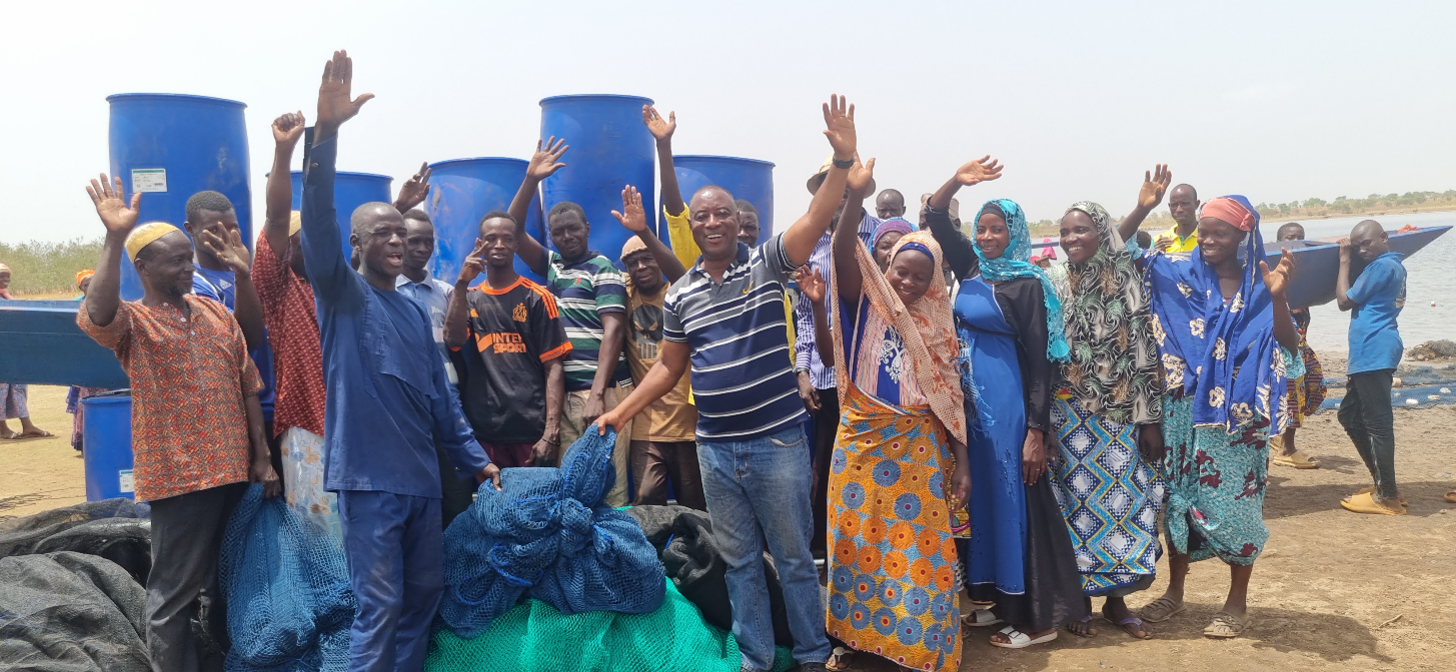A pilot project is introducing aquaculture in small reservoirs in a sustainable and scalable model.
By Giulia Zane (IWMI), Sarah Appiah (IWMI), Everisto Mapedza (IWMI), Marie-Charlotte Buisson (IWMI), Lawrence Ahiah (Fisheries Commission), Emmanuel Mensah (Water Research Institute – CSIR), and Ruby Asmah (Water Research Institute – CSIR)

“Before, we only used the dam for drinking and domestic uses, but now we have learned how it can create jobs and income for us” – Daraku Mohammed Mumin, fish farmer/project beneficiary, Nansoni community.
Northern Ghana concentrates the highest levels of food insecurity in the country (above 50% in many districts). Moreover, 90% of the households in these regions rely on rainfed agricultural livelihoods, which are increasingly affected by climate change. The Government of Ghana launched the One Village, One Dam (1V1D) program in 2017, aiming to build more than 500 small earth dams in rural areas to provide water security and irrigation.
But water can do more than just grow crops. It can also produce aquatic foods, such as fish, which are rich in protein and micronutrients. This is important for Ghana where fish provides more than 60% of the animal protein consumed in the diet and where micronutrient deficiencies are widespread especially among children and women. Fish can also generate income and employment for the youth and women, who are often marginalized and lack opportunities. However, at the moment, only a limited number of dams have communities catching wild fish and an even smaller number use the existing water infrastructure for aquaculture.
That is why the CGIAR Initiative on Aquatic Foods led in Ghana by the International Water Management Institute (IWMI), is partnering with the Fisheries Commission of Ghana (FC) and the CSIR Water Research Institute (CSIR-WRI) to leverage the 1V1D investment by promoting fish production in small earth dams in northern Ghana.
The initiative is piloting fish cage farming in four small dams in the North-East region, where community youth groups have received training and funding support to start their own fish businesses. The pilot sites are Langbinsi, Nalerigu, Nasoni, and Tombu in the East Mamprusi and Chereponi Districts. The youth groups are expected to use the profits from the first cycle of fish production to invest in the next cycles, creating a sustainable and scalable model. The initiative is also using remote sensing and socio-economic data for fish production in small reservoirs across northern Ghana, saving time and money for potential investors and implementers.
To share the progress and lessons learned from the pilot, a stakeholder workshop was held on 7 November 2023 in Walewale, North-East Region of Ghana. The workshop brought together various actors, including the Noth-East Regional Minister, representatives from the Northern Development Authority (NDA), Special Development Initiatives Secretariat – Office of the President, the National Development Planning Commission, District Chief Executives, Assembly persons, community beneficiary groups, NGOs, and universities. A field visit was also organized on 6 November 2023 to showcase the ongoing activities in two communities.
The workshop and field visit resulted in several recommendations, such as:
- Involving more women and youth in fish production and value chain activities, such as processing and marketing.
- Strengthening the capacity of the local institutions and communities to manage and monitor the fish production and the water quality of the dams.
- Integrating fish production with other uses of the dams, such as irrigation, livestock watering, and domestic uses to maximize the benefits from the infrastructure.
- Scaling up the pilot to other regions and districts with similar water infrastructure and potential for fish production.
The CGIAR Aquatic Foods Initiative is committed to working with the government and other partners to turn water into wealth and health for the people of northern Ghana and beyond. The Regional Minister for the North-East region, Hon Yidana Zakaria, expressed his support for the initiative and its implications for the next phase of the 1V1D program planned for 2024. He said: “The second phase of the 1V1D project should ensure that the dams can hold water all year round and that they are large enough to introduce aquaculture. This will serve as a source of livelihood for the youth in the region who are currently struggling with unemployment.”
Mr. Felix Asmah, Director for Monitoring and Evaluation, Special Development Initiatives Secretariat, also confirmed that the upcoming phase of the program should involve improving the dam infrastructure to make them suitable for multiple uses. This was an important confirmation of how the Resilient Aquatic Foods Initiative is informing future investments by the government to support the Sustainable Development Goals.

